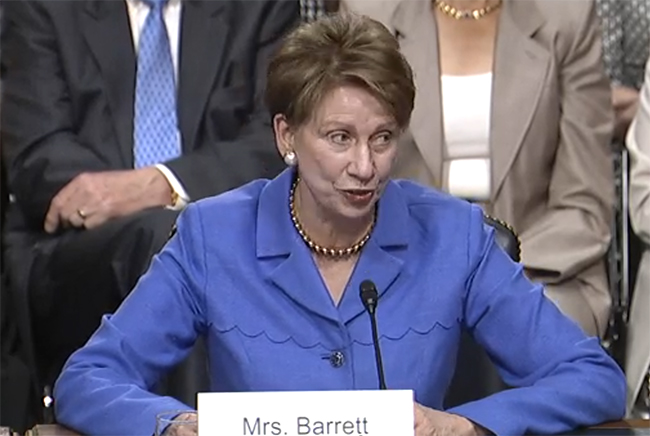
Barbara Barrett testifies before the Senate Armed Services Committee on Sept. 12, 2019, in Washington, D.C. SASC video screenshot
The Air Force will reach the threshold of KC-46 deliveries it needs to start retiring its two older tankers as soon as November, according to the nominee to be the service’s new secretary.
“Once tanker inventories reach 479, it is my understanding that the Air Force will begin divesting legacy tankers (96 KC-135s and all 59 KC-10s),” Barbara Barrett wrote in answers to advance policy questions provided to SASC ahead of her Sept. 12 confirmation hearing.
“The Air Force has said sequencing will be linked to basing actions and KC-46A deliveries,” Barrett wrote. “At the current delivery rate of three KC-46 aircraft per month, I understand the Air Force expects to reach that number by November.”
The service’s fiscal 2020 budget documents show a drop in the KC-10 inventory from 59 to 48 airframes between 2018 and 2020. For the KC-135, the Air Force plans to have 167 airframes in the Active Duty inventory, 164 for the Air National Guard, and 67 for the Reserve in 2020.
As of the end of August, the Air Force had received 19 KC-46s. The service plans to buy 179 Pegasus airframes overall, but the pace of deliveries has been stop-and-go due to multiple deficiencies. Experts at the Pentagon-funded research organization MITRE Corp. say the service should hold off on retiring the KC-10 “until KC-46 deliveries normalize.”
The White House formally nominated Barrett on Sept. 9 after President Donald Trump announced her as his pick on Twitter in May. She is a former deputy administrator of the Federal Aviation Administration, a former ambassador to Finland, and has held various positions in aerospace leadership.
“I would use the background that I have to work to negotiate and build the capability so that the [F-35] could be flown with less expense,” Barrett told lawmakers at the hearing. She added that her previous experience can be an asset as the Air Force furthers its partnerships abroad and increasingly focuses on the Arctic.
Barrett told the commitee her priorities include ensuring the Pentagon can deter conflict in space; building a warfighting ethos for the Space Force; recruiting, retaining, and training cyber operators; improving work-life balance across the force; ensuring the health and safety of airmen and their families; and understanding how the Air Force protects those who report sexual assault.
She also said she supports modernization of the nuclear enterprise, including the Air Force’s new air-launched nuclear cruise missile, and argues that “maximizing contract adversary air makes sense both fiscally and tactically.”
“I would look to delegate more decision authority and maximize rapid acquisition authorizations, like Section 804, that emphasize early prototyping to reduce risk and accelerate fielding,” she continued.
Barrett largely echoed the service’s positions on readiness, the need to redefine its force structure, and modernization needs.
In the context of Overseas Contingency Operations funding—which is used to fight America’s wars and is separate from the service’s base budget—Barrett noted that “a team of airmen recently conducted a detailed sustainment review and produced 45 recommendations to ensure aircraft and equipment are ready to meet combatant commander timelines.” New supply chain processes and data-driven maintenance, “along with OCO funding, should enable equipment reset for the next fight,” she said.
She suggested that the space launch market can sustain four launch service providers, as the Air Force, lawmakers, and industry debate how many contractors should be allowed to participate in the National Security Space Launch program. The Air Force believes two is the right number to split the launch schedule through 2026, despite having four interested companies.
“New, disruptive participants have already improved elements of the launch business and transformed thinking about what is possible,” Barrett wrote. “With reduced costs of launch and new miniaturized form factors of space vehicles, the space business is growing. Whether four providers are sustained in the long run or not, benefits accrue from participation of innovative thinking in the market.”
At the hearing, she said a top priority will be keeping the launch schedule running on time.
“We’ve developed not just a military and government capability, but commercial capability as well,” Barrett said. “We still need to have government capability and I’m fully supportive of continuation of that capability through the military.”
Barrett would succeed Heather Wilson, who departed in May to run the University of Texas at El Paso.